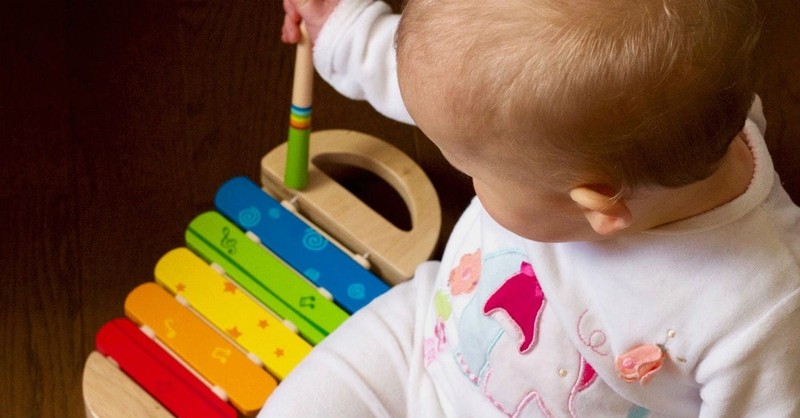
Whether you have just welcomed a new baby into the home or are near your due date, now is an ideal time to lay the valuable foundations that encourage the young one to continue living a Christ-centered lifestyle as he or she grows and starts to make choices that extend into adulthood. These years are not only ones to treasure, they are extremely important for who your child becomes in the future.
There are numerous ways you can naturally make your home and activities reflect your love for God. Here are just a few of the powerful ideas that can positively affect your child in small—but lasting—ways!

1. Show Christ’s Ways in Your Actions
Babies are incredibly perceptive and pick up on the things their parents do. That’s why it’s so important to constantly set a good example and make sure you’re living in a manner that reflects Christ’s love through your actions. Pay attention to the tone of your voice, have an understanding demeanor and be mindful of your facial expressions. Be aware how you communicate and interact with others. Your child will understand more than you think.
Photo credit: Unsplash

2. Focus on Biblical-Oriented TV Shows and Movies
Parents frequently keep their kids entertained by letting them spend time watching TV or enjoying their favorite films. When you occupy your baby in that way, specifically choose television shows and movies made from Christian brands or demonstrating Christian values. You’ll notice those options have character-building themes like showing kindness to others, sharing and giving respect to parents. Those morals will help shape your baby’s later actions. In addition, the images your baby will see when they’re young will be carried into adulthood.
Photo credit: Unsplash

3. Create a Biblical Theme in the Baby’s Room
Let a love for faith and God’s word start etching itself on the heart of your child. You might decorate with various kinds of stuffed animals to create a Noah’s Ark theme. Or you could go with a lamb motif to illustrate the loving way Christ acts as a shepherd to his flock. Don’t be afraid to create an environment that can spark your child’s imagination as they grow!
If you happen to be more crafty, you can also try wall stencils to spell out words such as “love,” “gratitude,” or “joy.” Even something as simple as a framed Scripture verse can serve as an everyday reminder of God’s love for you and your little one.
Photo credit: Unsplash

4. Pray in a Visible Manner
In Matthew, Jesus warns his disciples not to pray publicly as the hypocrites did, to make a show or prove a point. He wanted to discourage people from using prayer as a way to impress others and instead keep it as a time for intimate communion with God.
However, be careful to not misinterpret this scriptural teaching as a warning to not pray in front of your baby. But as you pray, let it be an intimate conversation you are bringing your child into. Let him or her see you giving thanks to God before meals, looking toward the heavens and asking for a safe journey before getting in the car, and so on. Let them see that it’s real.
Also, as your child becomes old enough to fully understand the meaning behind prayer, think about resources that show prayer as an enjoyable practice for kids. Your Christian bookstore has books filled with prayers designed for children, for example. Prayer is something deep and powerful, but also simple, relatable, enjoyable, and easy to do. Let them see it as something they would one day not feel obligated to learn, but want to do!
Photo credit: ©Thinkstock-LincolnRogers

5. Take an Active Role in Your Child’s Learning
Starting when they are very young, kids pick up on things that are happening in society and may mimic things they see from peers. Because of that reality, it’s so important to stay involved in what and how your child learns, doing what you can to ensure it reflects God’s teachings. And whenever something doesn’t—rather than run away from it, let it be an opportunity to point them to truth.
Begin researching Christian early-childhood education options in your areaand look for evidence of a balanced education, such as a well-rounded curriculum and a healthy environment with teachers who are patient, Bible-believing professionals who want to positively influence your child.
Even before elementary school, it’s important to be involved in your baby’s learning. For example, you might volunteer in the nursery where your child spends time at church or plan child-friendly Bible studies in your home. Look for educational resources that are centered on faith to round out their early education. With a strong Christian foundation, they will be equipped to go off on their own later in life.
Photo credit: Unsplash

6. Surround Your Baby with Christian Friends
Think about planning playgroups that happen in your home with your baby and friends you’ve found through a church. During conversations, don’t be surprised if you encounter other moms and dads who say, “Me too!” If that happens, you could expand your circle of friends while simultaneously exposing your baby to children who share some the same values. Your baby’s best friends may even turn out to be from Christian families, too.
Photo credit: Unsplash

7. Build a Christian Music Collection
Whether you’re using it to soothe your baby before bed or just offer some stimulation in the background, Christian music could become a big part of your life and another influence on the child’s upbringing. Seek out tunes with easy-to-understand lyrics and simple melodies. You might discover that as a result of hearing them, your baby might not come to have an ever-growing vocabulary of Christian words…but come to associate worship with something enjoyable.
Of course, singing along to childhood classics such as “Jesus Loves Me” is another way to actively involve your children in worship even from a young age.
Photo credit: Unsplash

8. Answer Your Child’s Questions with a God-Perspective
As soon as your baby becomes old enough to ask questions, he or she will start uttering a seemingly endless string of queries of how the world works, why you do certain things, and why things happen the way they do. When your little one starts wondering about things in nature or even the food you eat, remember to bring things back to our loving and wonderful Maker. You can bring things back to the roots by explaining how God created the earth and how your Heavenly Father gives your family access to nutritious and amazing foods. If God is in all things and behind all things, allow God to be associated with their sparks of curiosity. This will also create a sense of wonder at God’s greatness.
Maintaining a Christian home is an ongoing practice that spreads into everything you do and say, whether or not you actively address your baby. Keep in mind consistency and sincerity are both important. We must work hard to keep our values front and center, but we must also keep our relationship with the Lord fresh and real in our own lives.
This will make your faith more than an environment for your baby to grow up in. It will make your relationship with God something your child will want for themselves when they are older.
Photo credit: Unsplash
Sarah Landrum is a freelance writer on a mission to change the world and help people live happier, more enriched lives. She is also the founder of the career and happiness site Punched Clocks.
Originally published Tuesday, 14 November 2017.









